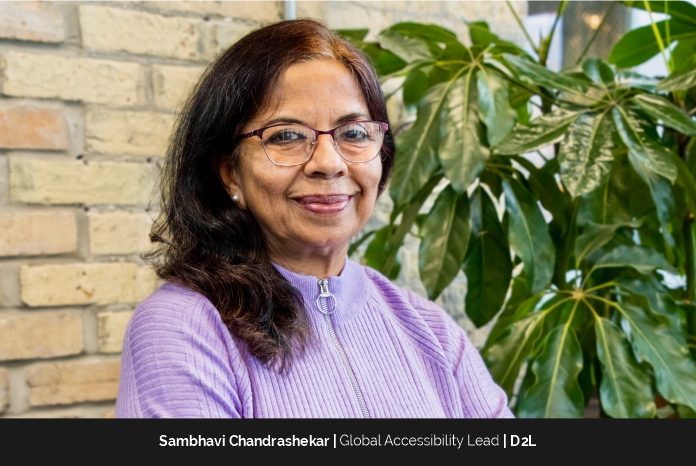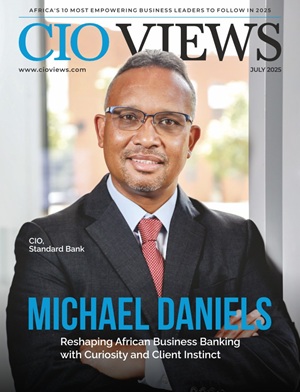
Sambhavi Chandrashekar, the Global Accessibility Lead of D2L, is a recognized accessibility champion and an award-winning inclusive educator/researcher. She has over 15 years of strategic and direct operational experience in implementing technology-based accessibility projects successfully in academia, the non-profit sector, and industry. She is passionate about helping transform the world into a more inclusive place.
Sambhavi thinks of success as a collective phenomenon, adhering to the principle of ubuntu: “I am because we are.” To her, success isn’t defined by positions of power or prestige, nor by material possessions. These could be incidental, but true success to her is about creating a positive impact in the lives of others through empathy and best efforts. When it comes to education, Sambhavi believes that success in learning is about setting and exceeding one’s own learning goals. “We’re all different. We’re not here to compete – we’re here to complete one another as a community. We can achieve collective success by recognizing our different needs and sharing our abundance. Humanity is a quality we owe to each other,” says Sambhavi.
Life lessons pave the path to a lifetime of skills.
Promoting inclusive design has been a major part of Sambhavi’s 17-year professional journey through academia, non-profits, and industry. “I am privileged to have been mentored over all these years by Dr. Jutta Treviranus, a global leader in inclusive design, and grateful for the influence she has had on transforming my life’s purpose” she says.
Inclusive design recognizes and respects human variability, incorporating multiple perspectives to create systems, products, and services that can be used by as many people as possible. Inclusive design is an iterative journey that never ends because it constantly adapts to a world that is complex and varying.
“Over these years, I have performed diverse jobs – from teaching in a graduate program, to working on funded projects or guiding product teams – but my role has always been about inspiring and enabling people to create more accessible and inclusive outcomes,” Sambhavi says.
Transforming mindsets to help people purposefully build inclusion into their work, whatever that work may be, has always been a key challenge that Sambhavi has enjoyed tackling throughout her career. She’s learned that it is more important to help people recognize why they need to think about and build inclusivity, than it is to teach them what to do and how to do it.
The successful journey of Sambhavi’s professional life
Sambhavi came to Canada in 2005 as a PhD student at the University of Toronto, where Dr. Treviranus was a member of her doctoral committee. Throughout her school, and work thereafter, Sambhavi remained focused on designing technology that is accessible to people with disabilities. She worked mostly with people with vision impairments.
After completing her doctorate, Sambhavi went on to do a two-year postdoctoral assignment funded by Mitacs Elevate. In the 5 years that followed, she taught a Master of Design program in Inclusive Design started by Dr. Treviranus at OCAD University. Between 2005 and 2016, Sambhavi also worked with a non-profit called the Inclusive Design Research Centre, headed by Dr. Treviranus.
In 2017, Sambhavi joined D2L with a mission to make inclusive design work as successfully in the education technology industry as she had seen it work in academia and the non-profit sector.
D2L and its services
D2L is a global learning technology company, leading the way into a new era of personalized learning by improving access to high-quality education for everyone, regardless of age, ability, or other differences.
Their signature technology products – D2L Brightspace and D2L Wave – enhance the learning experience for millions of learners at every stage of life, from the earliest days of school to the working world. Their team brings more than 20 years of global insight, expertise, and perspective to the most progressive and meaningful advancements in learning.
“We listen closely to our customer base of more than 15 million educators and learners to help bring their ideas to life through our Product Idea Exchange, where users can share product and feature ideas to help improve our products,” Sambhavi says. “We also keep an eye on the future with programs like the D2L Innovation Guild, which encourages innovative project partnerships between D2L and its customers to solve challenges for teaching and learning organizations around the world,” she explains.
Staying ahead of the competition by being a value-based business
Founded in 1999, D2L’s mission is to transform the way the world learns. Transformation, unlike change, is a journey. Their teams understand the why behind inclusion and stay on top of the what and the how of making their products and services accessible and inclusive. This leads to creating more consistent inclusive outcomes.
“We help guide our product and services teams and help them continuously innovate and cater to the complex adaptive world we design for. Inclusion is built into the core of D2L’s culture, and we remain focused on delivering inclusive education to the world in a meaningful way,” Sambhavi elaborates.
Sambhavi’s primary responsibility is to facilitate the alignment of D2L’s products and services with the company’s business purpose of reaching every learner, regardless of their age, abilities, or other human differences. Her team helps create the infrastructure to support inclusive education.
“My job is made easy because inclusion is a part of D2L’s organizational culture. Regardless of their role, everyone in D2L engages in their work with empathy in mind as every job ultimately touches learners in some way or the other.”
When it comes to education, it is important that no one is left behind.
D2L’s leadership is deeply invested in inclusion, thereby supporting diversity, equity, and accessibility. D2L practices inclusive design as an integral part of its product process. For them, enabling inclusion in education is a three-step process. It involves recognizing the diversity in their user base, enabling equity in their offerings to them, and enhancing impact through the practice of accessibility. They refer to this set of values as IDEA: Inclusion, Diversity, Equity, Accessibility.
D2L’s product process is embedded with IDEA. They involve people with disabilities in every step – research, design, engineering, quality assurance, and post-sale support – through in-house experts and their accessibility partner Fable. Designing with people with disabilities helps them support many others who might face similar constraints temporarily or situationally.
Ensuring a culture of integrity
Sambhavi says that she values her work at D2L because a culture of integrity permeates the entire company, including every team and every employee. Starting with the senior leadership, everyone upholds responsibility and accountability for their actions, exemplifying authentic leadership.
Leading by example is one of D2L’s important leadership competencies. Respect, reliability, trustworthiness, and flexibility are values that are reinforced repeatedly through well-organized policies, processes, and procedures. A business framework founded on strong values keeps the employees motivated to adopt and practice them. Commitment, culture, and community are the three pillars that guide D2L’s practice of accessibility and inclusion.
Work-life balance with pro-employee values
D2L’s CEO had this consistent message to employees during the pandemic that they must put on their oxygen masks first. Everyone was reminded often that they are running a marathon and not a sprint. There is no pressure from the company for employees to achieve exceptional performance at the cost of burning themselves out.
“I maintain a balance by reminding myself that I need to show empathy to myself just like I advocate to others,” says Sambhavi.
Sambhavi states that it is gratifying for D2Lers to witness how their work enables learners and instructors of different ages and abilities to successfully accomplish their educational goals. Being able to work with such a sense of purpose towards transforming the way the world learns is the key to their motivation.
Making an influential impact on the next generation
Sambhavi believes that youth need to be sensitized to think and act inclusively in anything they do because inclusive design is a paradigm that can be applied to any sphere to make the world a better place. She specifically motivates the next generation to work on “ensuring inclusive and equitable quality education and promoting lifelong learning opportunities for all” as spelt out by the United Nations’ Sustainable Development Goal #4.
“Enabling lifelong learning for all is important in a constantly changing world, and addressing diverse ages and abilities is crucial to making that successful,” Sambhavi says.
Sambhavi focuses on making accessibility and inclusion work globally. Human identity has numerous dimensions and these are inextricably intertwined, leading to further intersectional identities. Cultural and national identities play an important role in designing for global learners. They can be successfully addressed by being mindful of cultural differences and offering design choices to suit those cultural needs. “Designing with due respect for diverse human identities helps foster an inclusive learning environment and promotes globalization of education,” Sambhavi states.
Doing well by doing good
An important lesson the Covid-19 pandemic taught us is that we need to adapt through innovation to make the world more humane. As a businesswoman, Sambhavi’s goal is to promote the idea of doing well by doing good. She believes that empathy is not necessarily at odds with profit. “On the contrary,” she says, “values such as empathy and inclusion are essential to sustain profitability.”
Sambhavi’s message to aspiring businesswomen is to “create a value-based agenda that aligns with the business goals of the company.” To be successful, it is not enough to try to create change. Success requires transformation, which is about modifying the purpose and belief of a business system such that desired results are achieved in the normal course of business. It is also important to remain networked with the environment because we are not isolated beings but connected systems that thrive together.




















